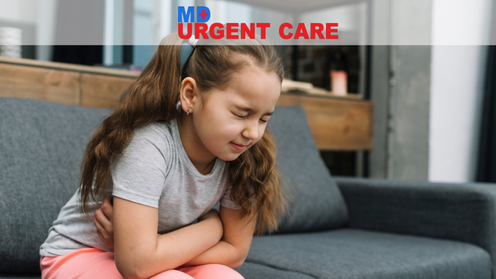Stomach issues in toddlers are every parent’s nightmare. Almost every child has experienced a stomach ache in their lifetime. There are many reasons for stomach pain in children, which include simple causes like indigestion, stomach infection (stomach flu), and constipation to more severe ones like appendicitis and intestinal obstruction.
It is often difficult to diagnose the exact cause of stomach problems in toddlers or small kids. Therefore, it should not be ignored or taken lightly, as they have a detrimental effect on the development of toddlers.
Stomach problem symptoms in toddlers
Symptoms of stomach problems in toddlers or small kids may vary depending on the underlying issue. Some common signs and symptoms of stomach problems in kids are:
- abdominal pain or cramps in the belly
- kids refusing their favorite foods or loss of appetite
- child putting his hands on the belly many times
- bloating of tummy
- diarrhea
- vomiting
- constipation
- trouble in sleeping and playing
- bouts of fever and generalized weakness
Types of stomach issues in toddlers/kids
Indigestion
It is one of the most common causes of stomach problems in children. Indigestion occurs when the children overfeed or eat something that doesn’t suit them, for example, spicy foods and carbonated drinks. Other causes of indigestion are fast eating, eating at inappropriate times, and stress. The children usually complain of pain in the center of the tummy or belly button area accompanied by restlessness and bloating of the belly. They may refuse to eat or become cranky. The pain of indigestion usually goes away after passing gases or stools. Other stomach pain remedies include:
- making them eat slowly and chew properly
- avoiding foods like carbonated drinks and other greasy and spicy foods
- avoiding overfeeding them
- ensuring proper rest and regular bowel movements.
Stomach ulcers
Although uncommon, stomach ulcers or peptic ulcers can occur in toddlers. The pain experienced by kids is quite sharp, as their stomach lining is thinner than adults. An empty stomach triggers the pain, or sometimes it occurs 2-3 hours after eating food. The child may complain of pain in the central area of the belly. Other symptoms of a stomach ulcer include:
- sharp pain under the breastbone
- nausea and vomiting
- loss of appetite
- dark-colored stools
- coffee-colored vomit
- bloating
Helicobacter pylori bacteria and long-term use of anti-inflammatory drugs like ibuprofen, aspirin, etc., given during fever cause stomach ulcers.
Stomach ulcer treatment involves
- a full course of antibiotics to kill the H.Pylori bacteria.
- proton pump inhibitors like omeprazole reduce excessive acid production.
- probiotics like curd to maintain gut health.
Stomach flu
Stomach flu or gastroenteritis is another common viral infection in small kids. It is caused by rotavirus or norovirus and affects the stomach and intestines. The infection persists for 2-3 days, presenting itself with symptoms that include:
- sudden episodes of watery diarrhea
- vomiting
- stomachache
- low-grade fever (maybe absent sometimes)
- body ache
- crying and irritability
A less severe attack of stomach flu subsides on its own after taking its course of time. Since it is a viral infection, no antibiotic is given to the children. Stomach flu treatment is given to relieve the symptoms of the infection. This includes:
- anti-diarrhoeal medications in case of severe diarrhea
- Oral rehydration solution (ORS) for dehydration
- light and easily digestible foods
- a low dose of antipyretic (pediatric dose) in case of fever
- lots of water to maintain hydration in kids.
Certain food allergies
Often neglected, food allergies to certain food groups, like dairy, wheat, nuts, etc., could be the reason for stomach pain in small kids. This often goes undiagnosed but should always be considered while feeding toddlers. Notice if the child complains of a stomachache or bloating after eating a particular food. Other symptoms of food-specific allergies include:
- diarrhea
- vomiting
- itching or red rashes on the skin
- lack of growth and continuous feeling of weakness in the body even after taking a nutritious diet.
- mental fogginess
There are tests to diagnose food allergies that can show what food item is causing harm to the child.
Stomach pain treatment for food allergies includes:
- Removing that food item from the diet.
- Getting adequate nutrition from other alternative sources; for example, dairy could be replaced with nut milk and wheat with other alternative flour.
Appendicitis
Appendicitis is a severe medical condition that occurs because of an infection in the appendix. If the child complains of severe pain on the right side of the lower belly continuously for some days, it could be because of appendicitis. The other signs and symptoms of appendicitis include:
- loss of appetite
- difficulty passing gas or stools
- low-grade fever
- nausea and vomiting
Appendicitis is diagnosed through abdominal ultrasound or CT scans. It is treated only with surgery.
Intestinal obstruction or intussusception
Another severe medical condition occurring in children is intussusception. It happens when one part of the intestine gets inside the other, blocking the passage to the bowels. It commonly affects children under three years of age.
The symptoms of intussusception are:
- sudden abdominal pain
- abdominal stiffness
- kid pulling his knees towards the belly
- blood and mucus-filled stools
- vomiting
- weakness
The pain usually lasts 10-15 minutes and often occurs in episodes.
Intestinal obstruction is diagnosed with physical examination and abdominal ultrasound or CT scans.
The treatment of intussusception involves:
- Air enema or liquid contrast enema to remove the obstruction by pushing the intestine back to its proper place. This procedure resolves the intussusception in 70% of cases with rare chances of recurrence.
- In case of perforation of the intestines or recurrence of intussusception, surgery is done to relieve the obstruction of the intestine and remove any dead tissue.
Call the doctors at MD URGENT CARE for treatment of all stomach issues in toddlers.
We are open 7 days/a week. Call us at Merrillville: at 219-487-5773 and Highland: at 219-513-8677, book online at www.mdurgentcare.us, or walk in!




